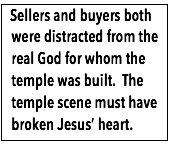|
Why did Jesus get so angry in the Sunday’s
Gospel?
His anger does not seem justified. Weren’t the
merchants just helping people? The crowd had come from far
away for the Passover feast. They had many different forms
of coinage and fno animals for sacrifice. Money-changers
were needed (think of the ones in international airports),
and there had to be a source of pigeons or sheep or
whatever they were to offer.
So, his action is strange, especially in the gospel of
John (which we are reading this Sunday for the special
feast), in which Jesus is portrayed as reconciler, God in
human form, the one whose love overflows. And now he
turning tables over? Why?
One easy answer is that the merchants and money changers
had gotten selfish and conniving. Maybe they were cheating
the people, acting like the proverbial butcher with his
thumb on the scale. Some of us get angry today when we see
the greed of huge corporations, of consumer culture, of
war-lords in war-torn countries, of those who exploit the
poor throughout the world. Maybe Jesus’ righteous
anger is quite in order.
 This is a good enough answer and there is a lot of truth
in it. This is a good enough answer and there is a lot of truth
in it.
But doesn’t God forgive sinners instead of whipping
them with cords and hurling tables onto the floor (what a
mess) and heaving the many carefully sorted coins all over
the place? Was this an act of love?
How could it be?
Let us spend some time looking at the Jesus who got so
upset.
First, he was raised in a culture in which temple
sacrifices were a normal way for people to reach for a
loving relationship with God. They were giving up the very
best things they had, as the theory went, to give a gift
to their Lord: the first fruit of the harvest, the best
lamb from the herd.
Second, therefore, when Jesus went up to Jerusalem for the
Passover, no doubt he expected to find people tendering
gifts to the transcendent God.
What did he find?
A most noisy market place, loud-mouthing its way into the
very temple itself, where it did not belong. The
“bottom line,” money, motivated it, skipping
all interaction with God. Sellers and buyers both were
distracted from the real God for whom the temple was
built.
The temple scene must have broken Jesus’ heart.
You see, Jesus was passionate, not pasty-faced. His temper
was directed at the wrongs being done. NO, he said. Your
SOUL has to be the bottom line, not GREED. Self-indulgence
is WRECKING the covenant of love. STOP IT.
Third, Jesus had issued forth from the very heart of the
Trinitarian God, where loving is total. His heart knew
that the Father had at last given his own very best gift,
his own finest lamb, to be the sacrifice that the human
race would offer. This lamb, Jesus, was to seal the Old
Covenant afresh, open whatever doors had been closed
between God’s transcendence and the grubby, earthy
world of flesh.
Maybe now we can see that his anger was a loving claim of
a truth. Buying and selling are fine, but they cannot
replace the gifts that come from God, nor the gratitude
that should be our good and tender response.
Let us put God first, not second, not last in our lives.
John Foley S. J.
Write me an
email! I'd like to have a discussion with you about
this.
|